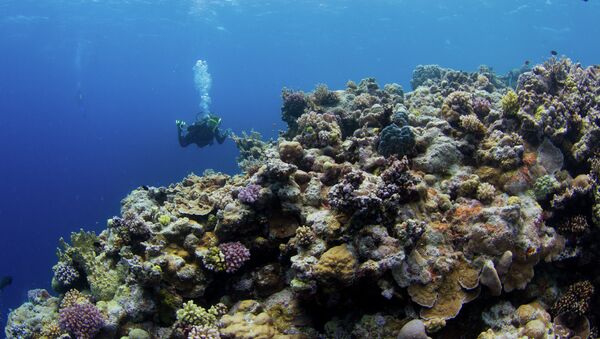“We are down to the wire,” Professor Terry Hughes, director of the ARC Center of Excellence for Coral Reef Studies at James Cook University, is quoted as telling the Guardian for a Thursday article.
The Great Barrier Reef Marine Park Authority has warned that sea surface temperatures are 1.5 degrees Celsius higher than average across large portions of the reef, and that readings in its central and southern areas are especially high - between 2 and 3 degrees Celsius above average.
High ocean temperatures lead to coral bleaching, a phenomenon in which coral polyps expel algae from their tissues and turn white.
“When a coral bleaches, it is not dead. Corals can survive a bleaching event, but they are under more stress and are subject to mortality,” the US’ National Oceanic and Atmospheric Administration explains on its website.
According to Hughes, increases in ocean surface temperature due to greenhouse gas emissions in the atmosphere will continue over the next few months.
“We are worried about the level of heat that’s out there now, with four weeks still to go until we get the peak of summer temperatures. That’s usually around mid-March. So with about a month to go, the pattern so far is following in the footsteps of 2016-17, and it’s already hotter than it was in the interim years. If it happens or not will depend on the vagaries of the weather for the next two weeks,” Hughes told the Guardian, warning that the current sea surface temperatures would likely lead to coral bleaching and that if the water gets even warmer, severe bleaching will occur, which can kill some coral polyps.
So far, Australia’s Bureau of Meteorology forecasts that temperatures across the northern areas of the reef will cool during the next couple of weeks, but the rest of the coral system is not expected to get much relief.
During the summers of 2016 and 2017, about half of the reef’s corals died due to severe bleaching outbreaks, and in August 2019, the Great Barrier Reef Marine Park Authority revealed that the reef’s outlook has deteriorated from “poor” to “very poor” for the first time. The World Health Heritage Committee will also review the Great Barrier Reef’s status in June to determine whether it should be placed on the organization’s “in danger” list.
An August 2019 study found that marine heat waves, defined as periods of extremely warm sea surface temperatures, can quickly cause the skeletal structures of corals to degrade, destroying them in just days or weeks.

